FORT HOOD, Texas - Three 1st Air Cavalry Brigade, 1st Cavalry Division, AH-64D Apache attack pilots were recognized during an awards ceremony March 18 for their courageous contributions in Iraq.
The pilots from Company C, 1st "Attack" Battalion, 227th Aviation Regiment, 1st ACB, 1st Cav. Div., were all awarded Air Medals with "V" device for valor by Las Vegas native Lt. Col. Christopher Walach, the regiment's commander.
The first pilot to be awarded was Freeport, Pa., native Chief Warrant Officer 2 Brent Gruber for events that transpired July 6.
The next two awards were presented to Norfolk, Va., native Capt. Nathan Schmidt, the commander of Co. C, and Fort Pierce, Fla., native Capt. Paul Daigle for their help in events that took place July 23.
Walach talked at length with each of the pilots - expressing his praise as a fellow Attack aviator.
With this awards ceremony came the memory of events from which these awards were born.
Gunship MEDEVAC
It was early in the morning when Gruber and pilot-in-command Chief Warrant Officer 3 Felic Vallot got the call to give air support to a special operations team while their AC-130 gunship, a fixed wing aircraft, went to refuel, said Gruber.
"Before we even got there, we started getting calls from (the team) saying that two of their Humvees hit (improvised explosive devices)," he said.
The explosions claimed two lives immediately, but there were three other team members still fighting for their lives. They instinctively called to the aviation crews for help.
Gruber was on the radio and helped guide the team into a nearby combat outpost, he said.
After arriving to the COP, the ground unit inquired to the Apache's medical evacuation abilities, Gruber said.
"The only capabilities we have is if they can sit in the front seat and if they're relatively conscious, then we can (extract) them," said Gruber.
Since one of the wounded could sit up, he was readied for the front-seat Apache ride to the combat support hospital in Baghdad, said Gruber.
The only obstacle in the way now was the landing. The COP was extremely dusty giving the pilots no visibility whatsoever to land. This was quite a treacherous feat, he said.
When Vallot and Gruber made it to the ground, Gruber jumped out of the front seat to help the medics load the injured team member - giving up his seat for his fellow brother in arms, said Gruber.
Once the injured trooper was loaded, Gruber strapped himself to the outside of the aircraft and they took off to the CSH, he said.
Gruber took part in a rare occurrence - a spur ride.
"This was my first spur ride. I think, all in all, in our battalion, there were three spur rides throughout the entire deployment. So it's not a common occurrence," he said. "It was just a completely new experience being completely outside the helicopter, flying over central Baghdad, looking down and having nothing around you."
The wounded trooper would recover fully from his wounds, said Gruber.
"The team member, as far as we know, made a full recovery. He definitely survived," he said.
The other two wounded warriors were medically evacuated by another rotary winged aircraft after the Apache departed.
Less than three weeks later, Co. C, 1-227th encountered another ground unit in distress, but this time it wasn't medical attention they needed, it was the presence and firepower.
Low, fast and shooting.
It was July 23 and Schmidt and Daigle's shift had just begun when they received a troops-in-contact distress call over the radio, said Daigle.
It turned out to be a direr situation than some antagonistic fire.
"I come to find out that it was one first lieutenant in this joint (combat outpost) by himself on the radio and all of his (radio operators) were at the guard towers shooting because they were getting overrun," said Daigle.
The enemy was about 60 strong and the JCOP had about eight Soldiers defending its borders because the main unit that resided there was out on patrol, he said.
"When we came in, the ground guys gave us the location to where the insurgents were, which was right across the street in what used to be the Iraqi Army post before it was taken," said Daigle.
When Daigle and Schmidt first got on station, they made multiple gun runs in the vicinity of the enemy position which cut the enemy fire coming into the JCOP significantly, said Schmidt.
"We were probably at like 15 feet off the ground and making a lot of noise and letting (the ground unit) know we got it and they aren't going to be overrun. And I know that's exactly what the ground guys needed," Daigle said.
"I feel that our presence really did help to calm the situation and enabled friendly forces to regain the upper hand," said Schmidt.
Just as the JCOP situation came under a semblance of control, the ground unit that was out on patrol started back to the JCOP.
"The unit that was out on patrol, that was from that JCOP, was trying to come back to reinforce. As they were coming back they got hit with IEDs, so they had two disabled vehicles."
After the patrol unit recovered as much as they could, the Apaches began scouting out a path for the patrol to get back to the JCOP safely, but not before more trouble came their way, said Daigle.
While watching for any threats towards the convoy, a Bradley gunner noticed a man with a rocket propelled grenade and immediately called up to the Apaches. He couldn't shoot the man because he was surrounded by children.
"I had flown by and seen all the kids. They looked as old as my son - just walking around there," said Daigle.
"So we came in real tight and as we came around the dude popped off two RPGs at us which passed just within 25 feet of our aircraft," he said.
The one insurgent with an RPG turned out to be two insurgents each with their own RPGs, he said.
Instead of firing at the enemy who were still surrounded by children, they fired into a grassy area nearby which scattered the children somewhat and drove the insurgents into a nearby house, said Daigle.
"We had every right to blow up that house and kill everybody in it, even if it was kids ... But I have a two year old son so I wasn't going to do it," said Daigle.
After the RPG incident, they led the ground convoy to the house where they apprehended the insurgents and also discovered a large weapons cache, said Daigle.
Daigle and Schmidt stayed nearby until another unit could take over, then they headed back to refuel and continue on with their regularly scheduled missions.
Daigle believes that the insurgents in that area were too accustomed to the local pilots who normally fly at high altitudes and look down from far above the ground. They weren't used to 1st Attack's tactics which are flying low, fast and shooting, he said with a big grin.
Although the Apache pilots didn't blow anything up, their presence and persistence kept the enemy at bay and also thwarted an attempt to overrun a JCOP, said Daigle.
"I think Apaches get a lot of credit for when they blow stuff up, but I don't think they get enough credit for the times they stopped things from happening," said Daigle. "Almost every troops-in-contact we went to, they'd stop shooting and hide amongst the women."
Awards and memories.
Now, as the Apache pilots pull off their medals to store them somewhere in the privacy of their own homes, they'll have those tokens to remind themselves of those days in July when they helped save the lives of Soldiers and Iraqi civilians.
These pilots are quick to pass recognition or fame to their buddies, but regardless of who gets pinned as the hero, they've all put themselves on the line for their comrades.
"The guys in this unit are the most experienced Apache pilots in Baghdad and in the entire United States Army," said Daigle.
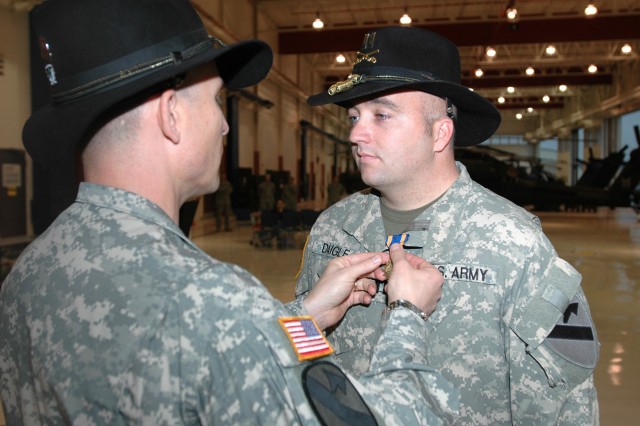
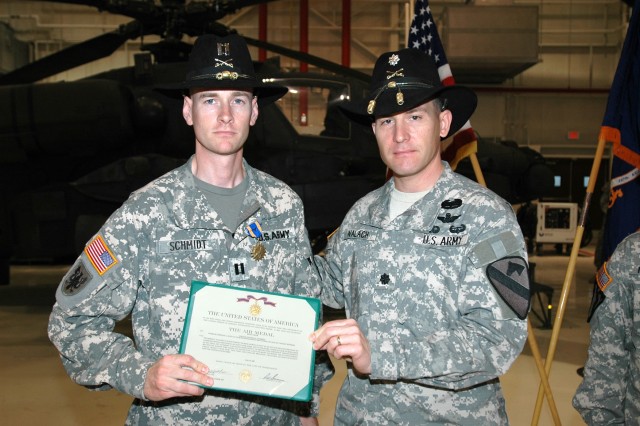
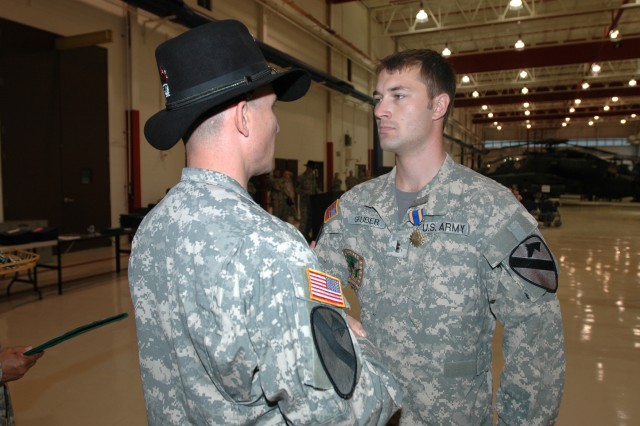
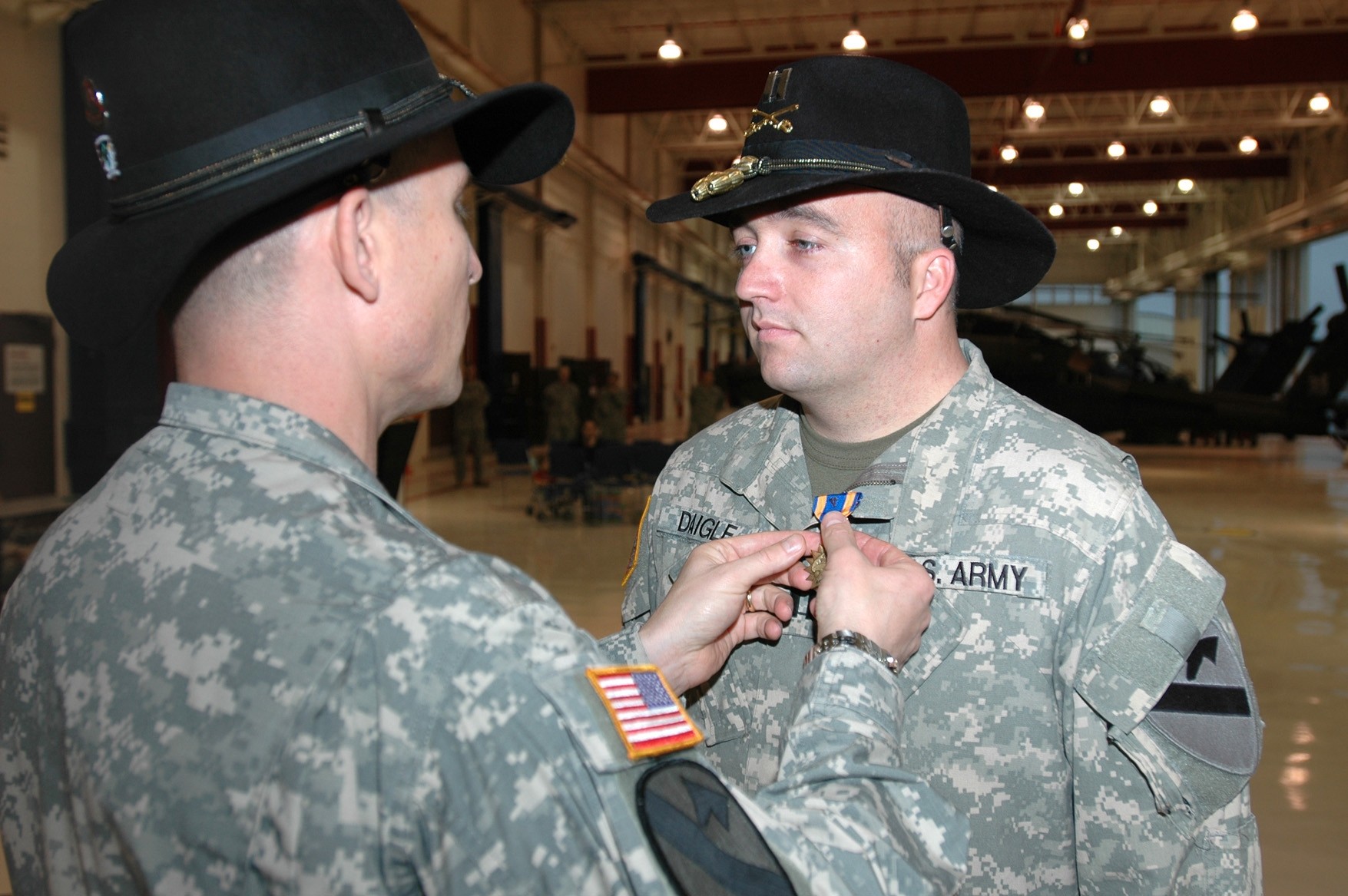
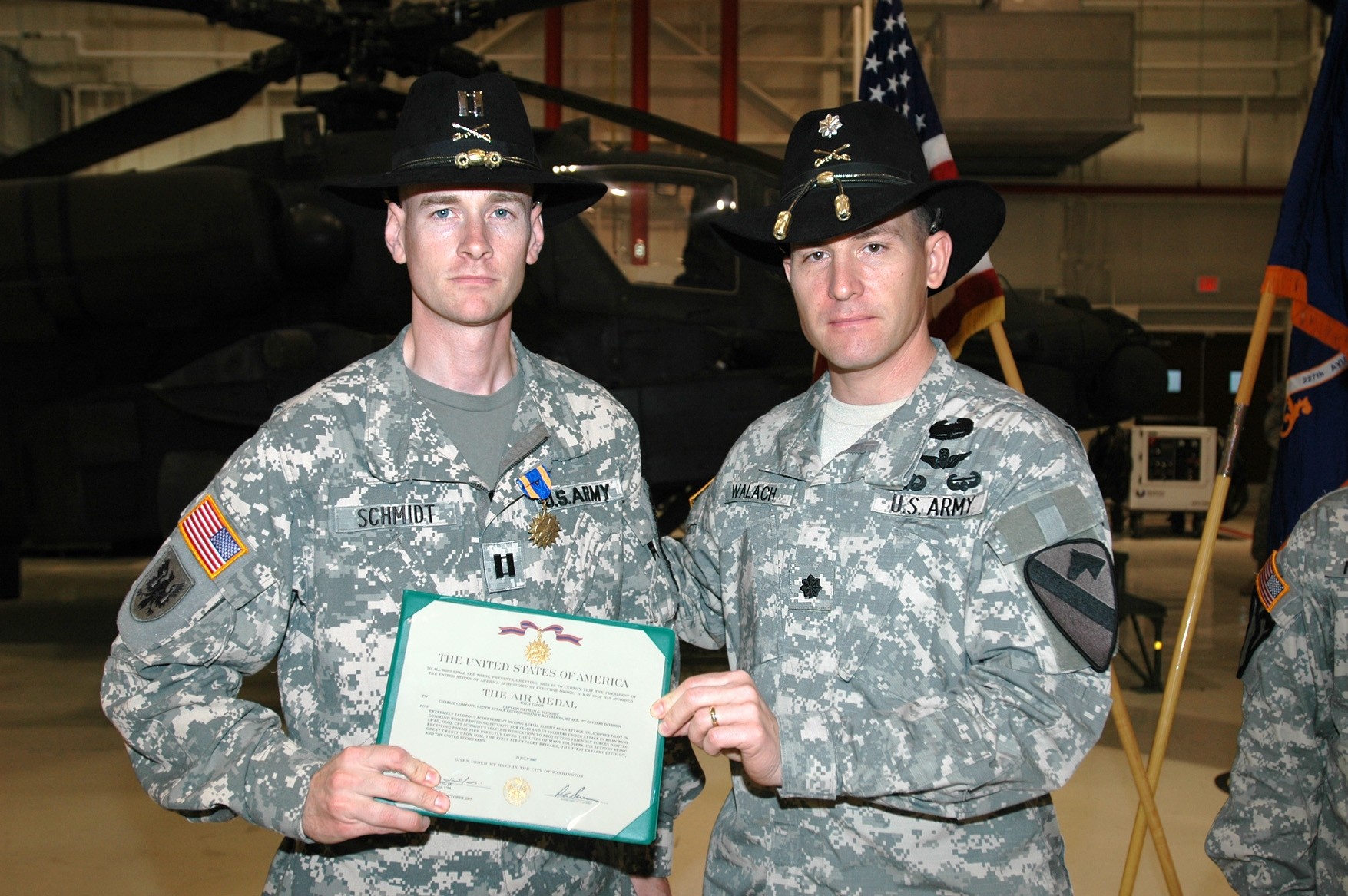
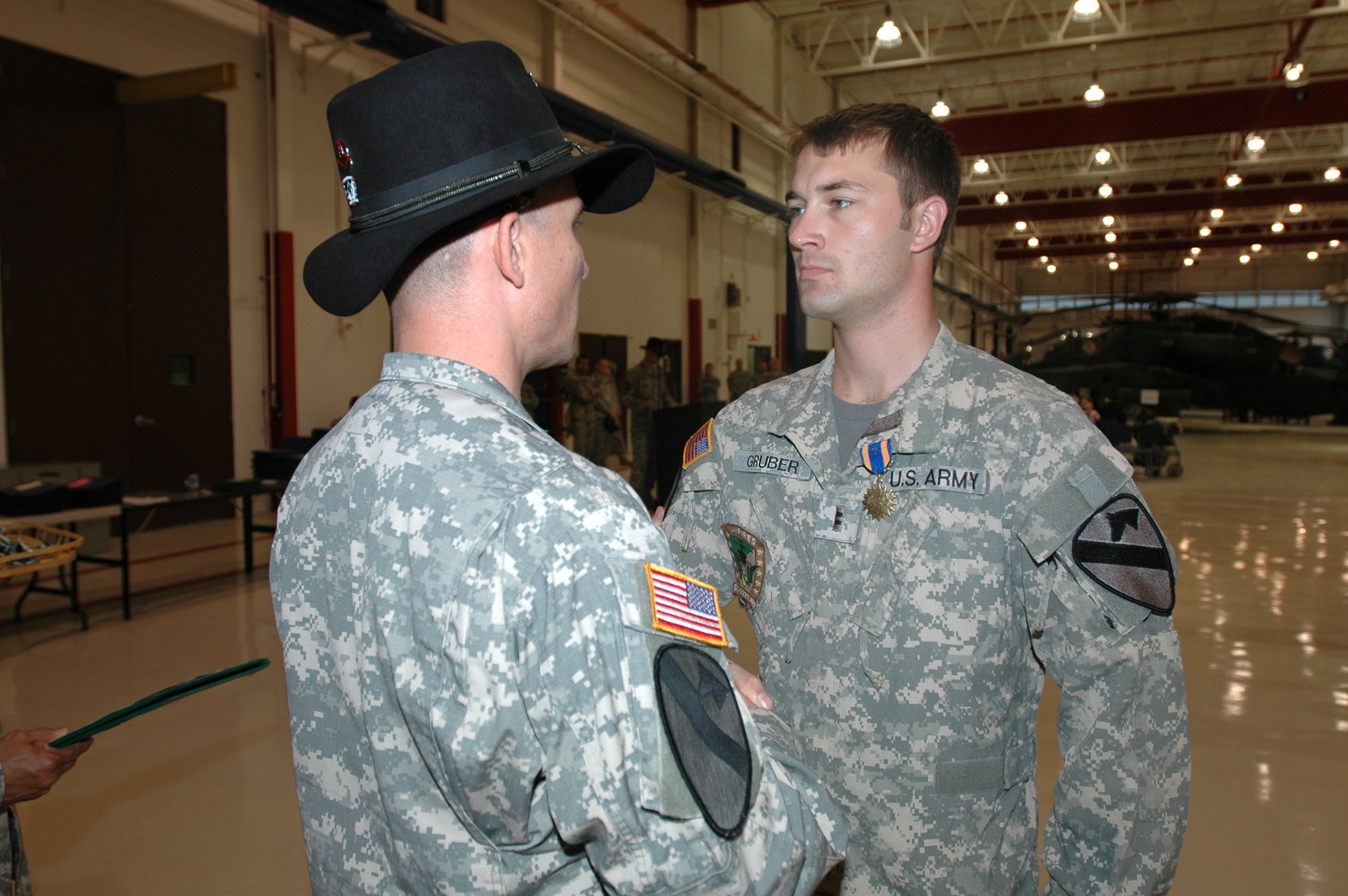
Social Sharing